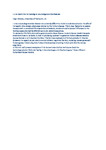Humanized mice to investigate neurodegenerative diseases
| dc.contributor.author | Kramer, Edgar | |
| dc.date.accessioned | 2018-07-24T11:52:33Z | |
| dc.date.available | 2018-07-24T11:52:33Z | |
| dc.date.issued | 2018 | |
| dc.identifier.uri | http://hdl.handle.net/10026.1/11873 | |
| dc.description.abstract |
Human neurodegenerative disease are currently difficult to model in rodents and only a handful of transgenic mice show a phenotype related to the human disease. This is most likely due to several reasons such as restricted life expectation of rodents, restricted environmental influences in the holding cages and slightly different gene and protein sequences. To overcome this limitation and to generate some more disease relevant mouse models bespoke alterations have to be made in mice. A promising approach to generate human disease relevant mouse models is to humanize the mice. This includes expression of human proteins in mice by viruses or transgenic constructs in a constitutive or regulated fashion, replacing mouse genes with human genes, introducing hole human chromosomes or adding human cells into the mouse organisms. In this talk I will present examples of this mouse humanization techniques from the neurodegeneration field and highlight the advantages and disadvantages of these different humanized mouse models. | |
| dc.language.iso | en | |
| dc.title | Humanized mice to investigate neurodegenerative diseases | |
| dc.type | conference | |
| dc.type | inproceedings | |
| plymouth.date-start | 2018-06-27 | |
| plymouth.date-finish | 2018-06-29 | |
| plymouth.conference-name | Experimental models in physiology | |
| plymouth.organisational-group | /Plymouth | |
| plymouth.organisational-group | /Plymouth/Faculty of Health | |
| plymouth.organisational-group | /Plymouth/REF 2021 Researchers by UoA | |
| plymouth.organisational-group | /Plymouth/REF 2021 Researchers by UoA/UoA01 Clinical Medicine | |
| plymouth.organisational-group | /Plymouth/Users by role | |
| plymouth.organisational-group | /Plymouth/Users by role/Academics | |
| dc.publisher.place | University of Exeter, Exeter, United Kingdom | |
| dcterms.dateAccepted | 2018-01-01 | |
| dc.rights.embargodate | 2023-7-19 | |
| dc.rights.embargoperiod | No embargo | |
| rioxxterms.licenseref.uri | http://www.rioxx.net/licenses/all-rights-reserved | |
| rioxxterms.type | Conference Paper/Proceeding/Abstract |


